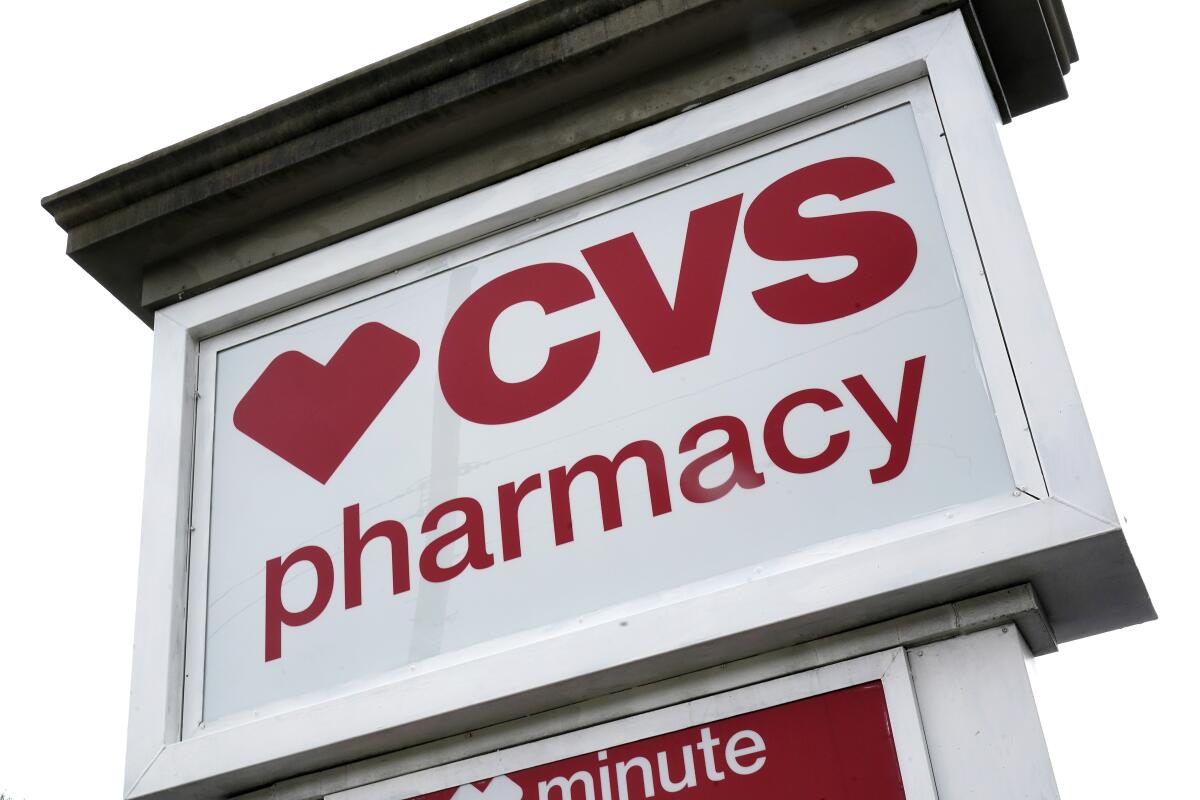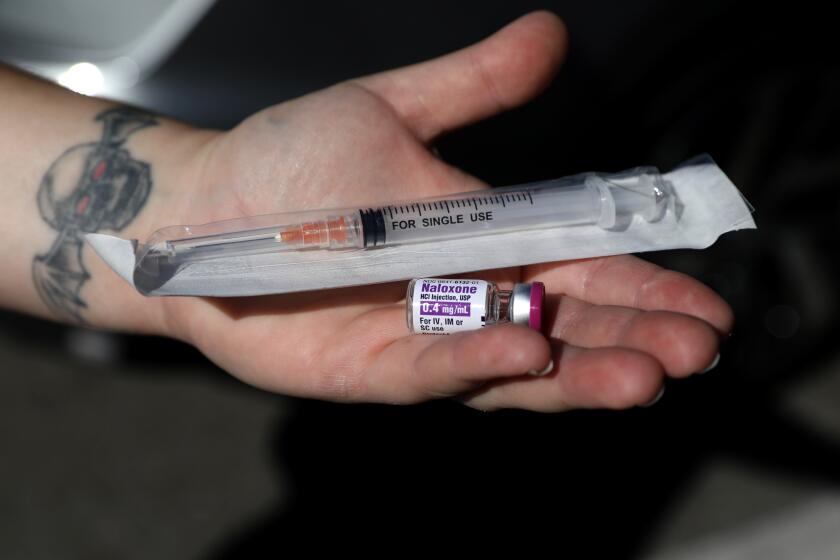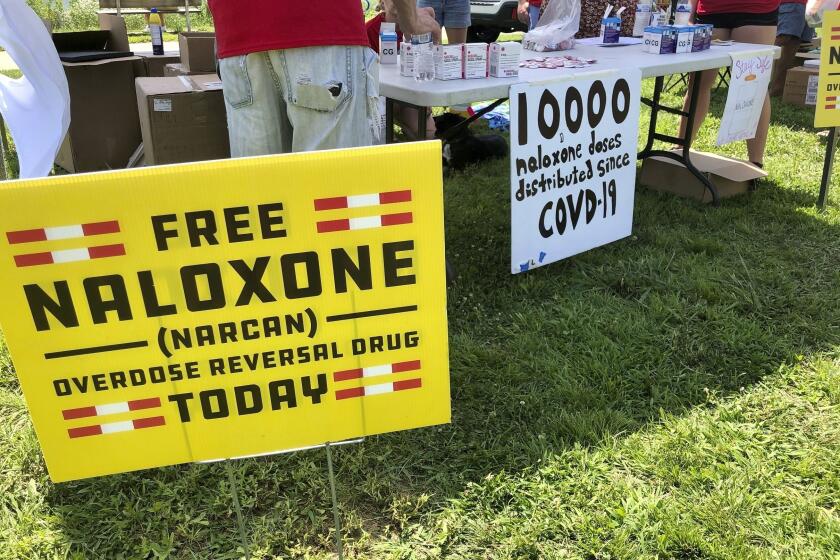CVS and Walgreens announce opioid lawsuit settlements totaling $10 billion

- Share via
CVS Health and Walgreen Co. announced agreements in principle Wednesday to pay about $5 billion each to settle lawsuits nationwide over the toll of opioids, and a lawyer said Walmart is also in discussions on a deal.
Together, the developments amount to what could be the last round of huge settlements after years of litigation over the drug industry’s role in an overdose epidemic that has been linked to more than 500,000 deaths in the U.S. over the last two decades.
In the lawsuits, governments said pharmacies were filling prescriptions they should have flagged as inappropriate.
The deals call for most of the funds from CVS, based in Woonsocket, R.I., and Walgreens, based in Deerfield, Ill., to be used to fight the opioid crisis through such efforts as expanding treatment and support programs for people with addiction, along with providing overdose antidotes and launching prevention campaigns.
In a conference call with analysts Wednesday, CVS Health Chief Executive Karen Lynch said the deal sprang from mediation discussions that started last month.
Under the tentative plans, CVS would pay $4.9 billion to local governments and about $130 million to Native American tribes over a decade. Walgreens would pay $4.8 billion to governments and $155 million to tribes over 15 years. The exact amount in the end would depend on how many governments join the deals.
The state and L.A. County have worked hard to make Naloxone more widely available. One of the hurdles, though, has been the price of the inhalable version, Narcan.
CVS announced its plan as it released an earnings report Wednesday, and Walgreens made a Securities and Exchange Commission filing with some details.
“We are pleased to resolve these longstanding claims and putting them behind us is in the best interest of all parties, as well as our customers, colleagues and shareholders,” Thomas Moriarty, CVS’ chief policy officer and general counsel, said in a statement. “We are committed to working with states, municipalities and tribes, and will continue our own important initiatives to help reduce the illegitimate use of prescription opioids.”
The company has launched educational programs and installed safe disposal units for drugs in stores and police departments, among other measures designed to reduce misuse of opioids.
Neither CVS nor Walgreens is admitting wrongdoing.
A bipartisan report from a congressional commission says the U.S. needs a new multi-pronged strategy to counter the nationwide overdose epidemic.
Representatives from Walmart did not immediately return calls Wednesday, but Paul Geller, a lawyer for governments in the lawsuits, said talks are continuing with the company.
“These agreements will be the first resolutions reached with pharmacy chains and will equip communities across the country with the much-needed tools to fight back against this epidemic and bring about tangible, positive change,” lawyers for local governments said in a statement. “In addition to payments totaling billions of dollars, these companies have committed to making significant improvements to their dispensing practices to help reduce addiction moving forward.”
The proposed pacts bring the nationwide tally of finalized and completed settlements between companies and governments over the opioid crisis to more than $50 billion.
“One by one, we are holding every player in the addiction industry accountable for the millions of lives lost or devastated by the opioid epidemic,” Connecticut Atty. Gen. William Tong said in a statement. “The companies that helped to create and fuel this crisis must commit to changing their businesses practices, and to providing the resources needed for treatment, prevention and recovery.”
Most of the 500,000 opioid-linked deaths in the U.S. over the last 20 years initially involved prescription drugs. As governments, doctors and companies took steps to make them harder to abuse and obtain, people with opioid-use disorder increasingly switched to heroin, which proved more deadly.
In recent years, opioid deaths have soared to record levels of around 80,000 a year. Most of those deaths involve illicitly produced versions of the powerful lab-made drug fentanyl, which is appearing throughout the U.S. supply of illegal drugs.
The CVS settlement was announced as litigation over the role of pharmacies in the opioid crisis has ramped up. On Tuesday, 18 companies — most of them pharmacy-related — submitted reports to a judge overseeing opioid litigation detailing where they face lawsuits.
Only a handful of opioid settlements have had bigger dollar figures attached than the CVS and Walgreen plans. Distributors AmerisourceBergen, Cardinal Health and McKesson this year finalized a combined settlement worth $21 billion, and drugmaker Johnson & Johnson finalized a $5-billion deal.
Purdue Pharma, the maker of OxyContin, and members of the Sackler family who own the company, have a proposed settlement that would involve up to $6 billion in cash plus the value of the company, which would be turned into a new entity with its profits used to combat the epidemic. That plan has been put on hold by a court.
More to Read
Sign up for Essential California
The most important California stories and recommendations in your inbox every morning.
You may occasionally receive promotional content from the Los Angeles Times.












